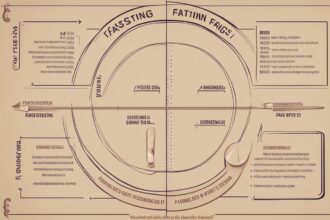Hey there, health enthusiasts! If you’ve ever found yourself torn between fasting and dieting as the best way to shed pounds or boost your wellness, you’re not alone. Both approaches have passionate advocates, promising results like weight loss, better energy, and improved metabolism. But which one is right for you? In this deep dive, we’ll compare fasting vs dieting, sprinkle in some actionable fasting tips, and unpack the science behind both strategies. Whether you’re a newbie to intermittent fasting or a seasoned dieter, stick around—I’ve got insights, tips, and evidence-based info to help you make an informed choice for your health journey.
What Is Fasting, and How Does It Work?
Fasting isn’t just about skipping meals—it’s a structured eating pattern where you cycle between periods of eating and not eating. Think intermittent fasting (IF), where you might fast for 16 hours and eat during an 8-hour window, or longer fasts like a 24-hour fast once a week. The goal? Give your body a break from constant digestion, allowing it to tap into stored energy (like fat) and trigger processes like autophagy, where cells clean out damaged components (Levine & Kroemer, 2019). Fasting has been linked to benefits like weight loss, improved insulin sensitivity, and even better brain health (Mattson et al., 2017). But it’s not a one-size-fits-all solution, and knowing some key fasting tips can make or break your experience. It’s less about “what” you eat and more about “when” you eat, which sets it apart from traditional dieting.
What Is Dieting, and How Does It Differ?
Dieting, on the other hand, typically focuses on “what” and “how much” you eat rather than timing. From keto to vegan to calorie counting, diets often involve restricting certain foods or overall intake to create a calorie deficit for weight loss or health gains. While fasting might let you eat whatever you want in your eating window (within reason), dieting often comes with strict rules—like cutting carbs or tracking macros. Studies show that many diets can be effective for short-term weight loss, but sustainability is a challenge, with many regaining weight over time (Johnston et al., 2014). Dieting often requires consistent willpower, whereas fasting can feel more flexible once you get the hang of it with the right fasting strategies.
Health Benefits: Fasting vs Dieting
Let’s break down the health perks of each. Fasting, particularly intermittent fasting, has been shown to improve metabolic health by lowering insulin levels and increasing fat-burning hormones like norepinephrine (Anton et al., 2018). It may also reduce inflammation and support heart health by improving blood pressure and cholesterol levels (Patterson & Sears, 2017). Dieting, depending on the type, can also deliver results—think Mediterranean diets lowering cardiovascular risks or low-carb diets aiding blood sugar control (Estruch et al., 2013). However, fasting’s benefits often kick in without needing to obsess over food choices, which is a win for simplicity. Meanwhile, dieting might offer more tailored nutrition if you’re addressing specific deficiencies or conditions. The trick is finding what aligns with your lifestyle, and I’ll share some fasting advice later to help with that.
Challenges and Pitfalls of Each Approach
No health strategy is without hurdles. Fasting can be tough at first—hunger pangs, irritability, and low energy are common as your body adjusts. It’s also not ideal for everyone, like those with certain medical conditions or pregnant individuals. Dieting, meanwhile, often feels restrictive, leading to cravings or binge eating when willpower wanes. Plus, overly strict diets can mess with your metabolism if calorie intake drops too low for too long. Both require commitment, but fasting might edge out for ease once you master the rhythm. Curious about making fasting smoother? Check out these fasting tips for beginners below to avoid common pitfalls.
Practical Tips to Succeed with Fasting
If you’re leaning toward fasting, I’ve got you covered with some tried-and-true advice. These fasting tips are designed to help you start strong and stick with it, whether you’re exploring a 16:8 plan or a 5:2 approach.
- Start slow: Don’t jump into a 24-hour fast right away. Begin with a 12:12 schedule (12 hours fasting, 12 hours eating) and gradually extend your fasting window.
- Stay hydrated: Drink plenty of water during fasting periods to curb hunger and support your body’s processes. Herbal teas or black coffee can help too.
- Plan your meals: Use your eating window wisely by focusing on nutrient-dense foods—think lean proteins, veggies, and healthy fats—to keep you full longer.
- Listen to your body: If you feel dizzy or overly fatigued, break your fast. It’s okay to adjust based on how you feel.
- Track progress: Use a journal or app to log your fasting hours and note energy levels or weight changes to stay motivated.
Practical Tips to Make Dieting Work for You
If fasting isn’t your vibe, dieting can still be a powerful tool with the right mindset. Here are some strategies to help you navigate dietary changes without feeling deprived, while still complementing ideas like fasting benefits if you ever combine approaches.
- Focus on balance: Instead of cutting out entire food groups, aim for moderation—fill half your plate with veggies, and include protein and whole grains.
- Prep ahead: Meal prepping can save you from impulsive eating. Cook batches of healthy meals to grab when hunger strikes.
- Avoid “all or nothing” thinking: One slip-up doesn’t ruin your progress. Get back on track with your next meal instead of giving up.
- Seek support: Join a community or buddy up with a friend to share recipes and keep accountability high.
Whether you’re drawn to fasting or dieting, the key is consistency and customization. I’ve seen folks thrive on fasting by using simple fasting hacks like timing workouts during eating windows to refuel properly. Others swear by dieting because it lets them control portions while enjoying variety. The science backs both for weight loss and health gains, but your success hinges on what feels doable long-term. For instance, a 2020 study found intermittent fasting and calorie restriction yield similar weight loss results over 12 months, but adherence rates varied based on personal preference (Trepanowski et al., 2017). So, experiment—maybe even blend the two by pairing fasting with a balanced diet during eating windows.
In wrapping up, fasting and dieting each offer unique paths to better health, and neither is inherently “better”—it’s about what fits your life. Fasting shines for its simplicity and metabolic perks, especially with solid fasting tips to guide you through hunger or fatigue. Dieting, meanwhile, gives you control over nutrition but demands more planning. Reflect on your goals: Are you after quick resets or gradual change? Do you crave structure or flexibility? Try starting with small steps—maybe a beginner fasting schedule or a less rigid diet—and tweak as you go. I’d love to hear your thoughts or experiences in the comments. Have you found success with fasting or dieting? What’s worked for you?
References
- Obesity, 26(2), 254-268.
- Estruch, R., Ros, E., Salas-Salvadó, J., Covas, M. I., Corella, D., Arós, F., … & Martínez-González, M. A. (2013). Primary prevention of cardiovascular disease with a Mediterranean diet. New England Journal of Medicine, 368(14), 1279-1290.
- Johnston, B. C., Kanters, S., Bandayrel, K., Wu, P., Naji, F., Siemieniuk, R. A., … & Mills, E. J. (2014). Comparison of weight loss among named diet programs in overweight and obese adults: A meta-analysis. JAMA, 312(9), 923-933.
- Levine, B., & Kroemer, G. (2019). Biological functions of autophagy genes: A disease perspective. Cell, 176(1-2), 11-42.
- Mattson, M. P., Longo, V. D., & Harvie, M. (2017). Impact of intermittent fasting on health and disease processes. Ageing Research Reviews, 39, 46-58.
- Patterson, R. E., & Sears, D. D. (2017). Metabolic effects of intermittent fasting. Annual Review of Nutrition, 37, 371-393.
- Trepanowski, J. F., Kroeger, C. M., Barnosky, A., Klempel, M. C., Bhutani, S., Hoddy, K. K., … & Varady, K. A. (2017). Effect of alternate-day fasting on weight loss, weight maintenance, and cardioprotection among metabolically healthy obese adults: A randomized clinical trial. JAMA Internal Medicine, 177(7), 930-938.






